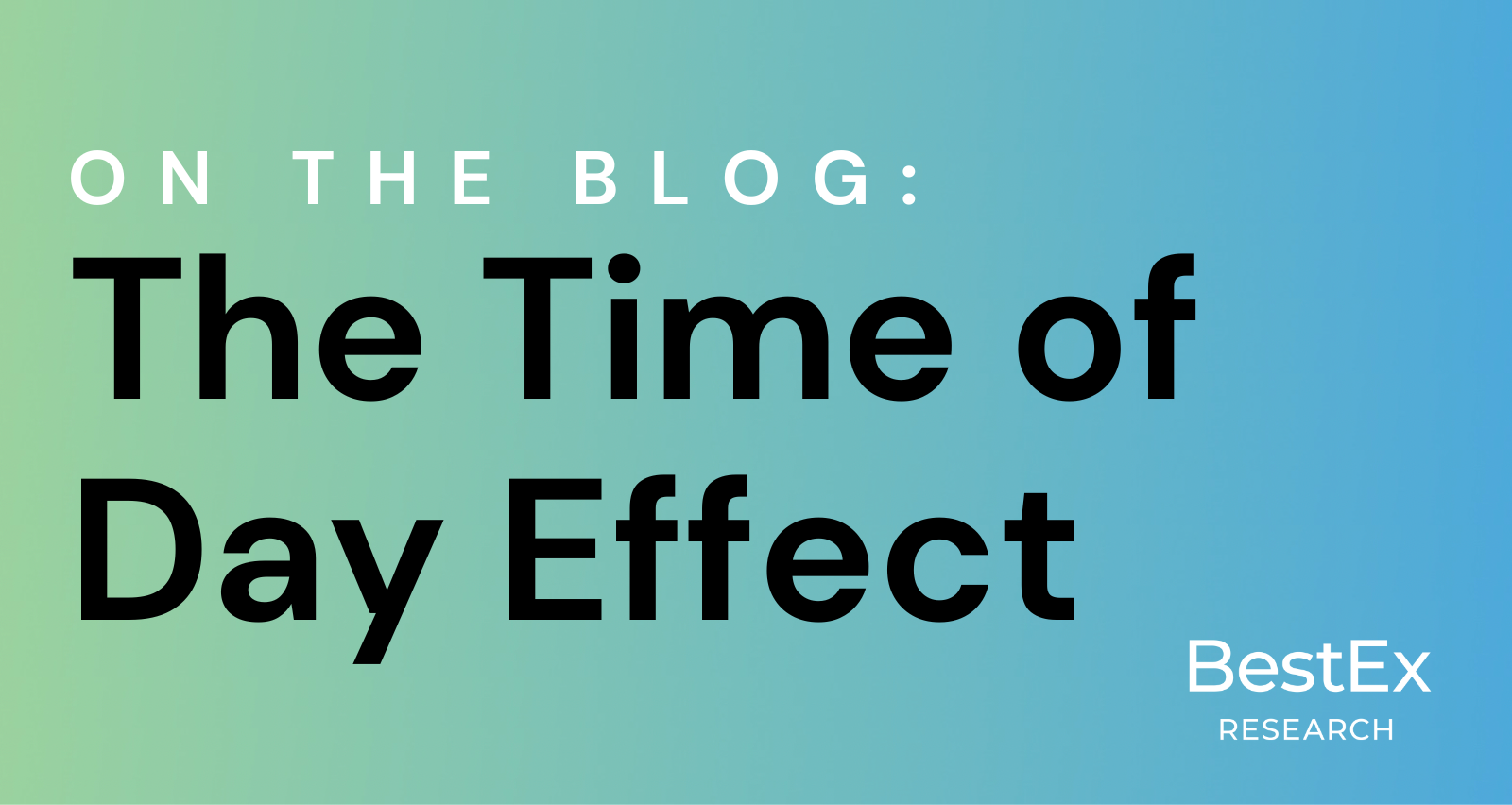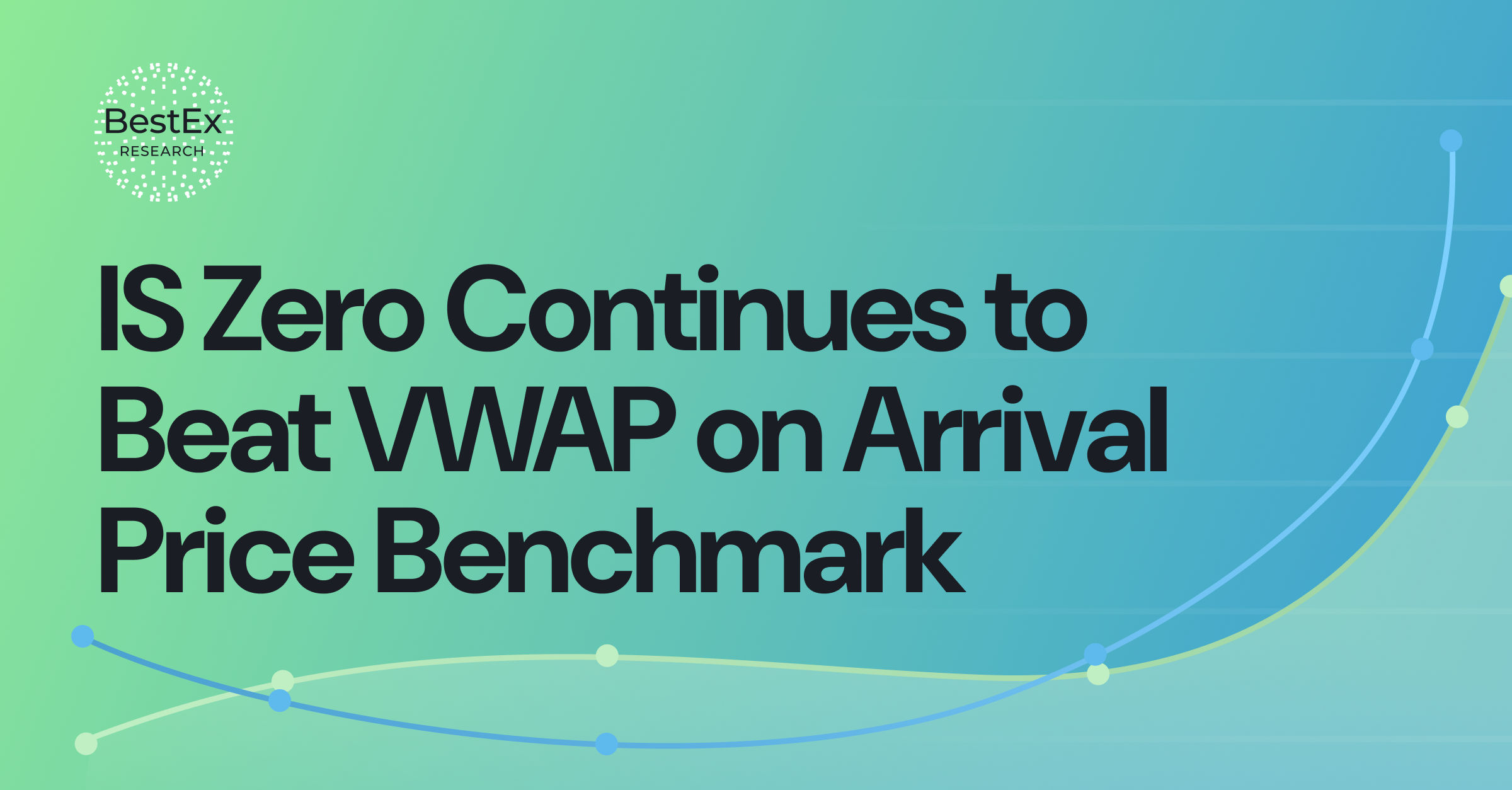

Articles

Optimizing trading cost by leveraging "The Time of Day Effect"
July 29, 2025
In this article, we examine how trading costs vary throughout the day, independent of volume, revealing a persistent Time of Day Effect.

IS Zero Continues to Beat VWAP Algo on Arrival Price Benchmark
June 2, 2025
One year in, IS Zero is rewriting the playbook for low-urgency trading as it delivers on its promise–consistently beating VWAP’s implementation shortfall (IS) performance for low-urgency orders.

Asking the Right Questions: Rethinking Single-Dealer Platform (SDP) Performance
April 3, 2025
Hitesh Mittal shares his perspective on Single Dealer Platforms (SDPs) and key questions to ask when considering whether to include them in an optimal routing strategy

Our Breakout Year & The Road Ahead
January 29, 2025
Hitesh Mittal shares an update on BestEx Research’s most successful year yet, highlighting key achievements, product innovations, and the firm’s vision for 2025.

Unwrapping the Impact of Holiday Period on Futures Market Liquidity
December 10, 2024
In this article, we've highlighted the impact of holiday period on the volume and volatility of Futures market

The Impact of US Presidential Election on Futures Market Liquidity: Insights from Y2K to 2024
November 4, 2024
In this article, we've highlighted some key historical observations on the effects of the past 20 years of presidential elections on futures market liquidity (on election day and the following day).

Standard vs. Parkinson Volatility for Execution Algorithms: Understanding the Trade-offs
October 17, 2024
In this article, we conduct an empirical analysis comparing the standard deviation of returns method to Parkinson's volatility calculation.

Order Aggregation: Improving Execution for Multiple Parent Orders on the Same Instrument
October 3, 2024
Now available for both futures and equities from BestEx Research

Regulation NMS Amendments: Summary & Impact
September 19, 2024
This summary by our Founder & CEO, Hitesh Mittal, explains the SEC's changes to U.S equity market structure regulations announced on September 18, 2024.

Understanding and Accessing Order Stitching in Transaction Cost Analysis
April 11, 2024
In this blog post, we'll delve into what order stitching is and why it’s important, as well as the nuances associated with the calculation of analytics and how we handle them in our own TCA.

INTRODUCING IS ZERO: Reinventing VWAP Algorithms to Minimize Implementation Shortfall
January 24, 2024
IS ZERO, a meticulously engineered, low-urgency IS algorithm that combines the desirable features of VWAP with improvements to effectively minimize implementation shortfall.

We Care How You Fill: Reflecting on 2023 and Looking Ahead
January 10, 2024
As we mark the end of a remarkable year and begin 2024, we’re reinforcing our commitment to excellence with a phrase that embodies our longstanding dedication: "We care how you fill."

Rethinking Participation Rates and RATS: Empirical Insights for Trading and Regulation
November 8, 2023
In this post, we propose an empirical approach using trade and quote data to determine appropriate participation rates based on what is commonly encountered in the market.

Fine-Tuning Participation Rate Constraints for Portfolio Construction in Futures Trading: An Empirical Approach
September 19, 2023
In this blog post, we present an empirical approach to refining participation rate constraints for portfolio construction and trading for various futures contracts.

Designing Optimal Implementation Shortfall Algorithms with the BestEx Research Adaptive Optimal (IS) Framework
June 1, 2023
In this article, we're detailing the motivation and the features behind the launch of our new Adaptive Optimal (IS) Framework for designing and optimizing implementation shortfall execution algorithms.

BestEx Research Comment Letter on SEC's Proposed Order Competition Rule
March 29, 2023
Here we share the comment letter that we've submitted to the SEC on the proposed Order Competition Rule. In it, we express our support of the rule and detail suggestions for changes so the rule's implementation has its intended impact.
.webp)
Who’s More Competitive: Wholesalers or Exchanges?
January 23, 2023
The SEC's proposed Order Competition Rule aims to increase competition in the market for retail investor orders. In this paper, we provide a summary of the proposed changes, discuss how “competitiveness” can be measured, and analyze the potential impact of the rule on institutional investors.
.webp)
The Dangers of Cut & Paste in Futures Algorithms
September 26, 2022
Some execution algorithm providers approach the design of futures algorithms by starting with an equity algo base and editing the details to tailor to the specificities of trading futures. While this approach may create a fair foundation, it leads to unnecessarily high trading costs. In this paper, we introduce the biggest challenges associated with futures execution and how they can impact execution costs.

A Note of Thanks
July 18, 2022
A message of thanks to our clients and partners for their support and their votes, awarding us Best Algorithmic Trading Provider in the 2022 Waters Rankings.
.webp)
Single Dealer Platforms in Execution Algos: Buyer Beware
June 1, 2022
Single dealer platforms (SDPs) are alternative sources of liquidity for US equity execution algorithms, and the negative consequences of using them are not well understood. In this paper, we dispel some of the common marketing misconceptions we most often hear about trading with SDPs.

Payment for Order Flow: A Prisoner’s Dilemma
May 11, 2021
In this short post, CEO Hitesh Mittal shares why change is difficult in the existing market structure where payment for order flow is so common.

Let the PFOF Debate Begin
May 4, 2021
In this short post, CEO Hitesh Mittal presents the opposing viewpoints in the debate around payment for order flow and refutes some of the commentary in opposition to our recent research paper on this topic.

Unpacking the SEC’s Final Rule about Modernizing Market Infrastructure
December 16, 2020
In March 2020, the SEC proposed groundbreaking changes that would affect RegNMS, including the content of consolidated market data. In this article, we review the final ruling and its projected impact on institutional investors.

BestEx Research Comment Letter on SEC’s NMS II Proposal
May 21, 2020
Here, we share the comment letter we have submitted to the SEC regarding their 595-page proposal for modifications to RegNMS and the SIP feed.

Investors Win with SEC’s NMS II Proposal
May 21, 2020
Earlier this year, the SEC released a 595-page proposal centered on modifications to RegNMS and improving the SIP. We believe the proposed changes will help all investors, and we have submitted a comment letter to the SEC with a few thoughts that we summarize in this article.

Potential Implications of CBOE’s New Market Close Order
March 4, 2020
CBOE Global Markets, owner of BATS Exchange, recently received approval from the SEC for a preMOC mechanism called CMC (CBOE Market Close). The CMC will launch on March 6, 2020, and it represents a significant change to US equity market structure. In this article, we describe the proposed order type and its potential impacts on institutional investors.
Subscribe to our research releases
Subscribe to stay in touch with our latest insights, news and events on ....
